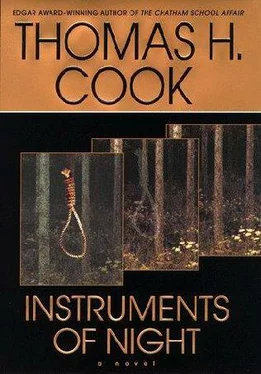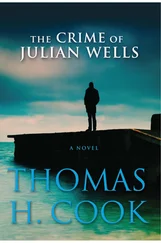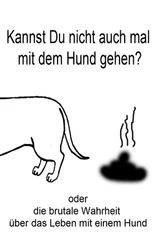Thomas Cook - Instruments of Night
Здесь есть возможность читать онлайн «Thomas Cook - Instruments of Night» весь текст электронной книги совершенно бесплатно (целиком полную версию без сокращений). В некоторых случаях можно слушать аудио, скачать через торрент в формате fb2 и присутствует краткое содержание. Жанр: Триллер, на английском языке. Описание произведения, (предисловие) а так же отзывы посетителей доступны на портале библиотеки ЛибКат.
- Название:Instruments of Night
- Автор:
- Жанр:
- Год:неизвестен
- ISBN:нет данных
- Рейтинг книги:3 / 5. Голосов: 1
-
Избранное:Добавить в избранное
- Отзывы:
-
Ваша оценка:
- 60
- 1
- 2
- 3
- 4
- 5
Instruments of Night: краткое содержание, описание и аннотация
Предлагаем к чтению аннотацию, описание, краткое содержание или предисловие (зависит от того, что написал сам автор книги «Instruments of Night»). Если вы не нашли необходимую информацию о книге — напишите в комментариях, мы постараемся отыскать её.
Instruments of Night — читать онлайн бесплатно полную книгу (весь текст) целиком
Ниже представлен текст книги, разбитый по страницам. Система сохранения места последней прочитанной страницы, позволяет с удобством читать онлайн бесплатно книгу «Instruments of Night», без необходимости каждый раз заново искать на чём Вы остановились. Поставьте закладку, и сможете в любой момент перейти на страницу, на которой закончили чтение.
Интервал:
Закладка:
In addition, Portman had collected scores of photographs of Riverwood itself, pictures of the grounds and the lake taken from various angles and at different times of day, of the granite bluff that overlooked Manitou Cave, of the trail that led from it to the river below. He’d collected photographs of people too. The servants who worked at Riverwood, the men employed to build the second cottage, along with each member of the Davies family and their two summer guests, Andre Grossman leaning casually against the wall of the boathouse, Mona Flagg in a white summer dress, her back to the pond, her body bathed in a brilliant summer light. On the back of each picture Portman had reproduced the timetable he’d constructed for each person photographed, one which followed that person’s movements from approximately 8:30 A.M., when Faye Harrison had been seen sitting alone in the gazebo, until 4:00 P.M. that same afternoon, by which time she was already dead. At the end of each report he’d listed those witnesses who’d been able to substantiate the claims of each person, the household servants who’d seen each other as well as members of the Davies family at various times, along with the witnesses who’d seen Edward and Mona on the river.
“Portman said that his father had all the pictures spread out on the bed before he died,” Eleanor said as she began to arrange the photographs on the narrow bed.
She plucked one of the photographs from the rest, a shot of Allison and Mr. Davies as they strolled beside the pond, Allison’s arm tucked inside her father’s. “Even if Portman had known that someone at Riverwood had a powerful reason to kill Faye, there was still no opportunity for any one of them to have done it.”
Watching her, it struck Graves that she examined photographs in the way Slovak examined them, searching intently for the odd, the thing that didn’t fit.
She picked up a second picture. Faye posed before the desk in Mr. Davies’ office, to her right the enameled box in which Mrs. Davies had stored Grossman’s letters, its lid open, filled with candies wrapped in bright foil. Faye had taken one from the box and held it at her mouth. “Well, we know one thing for sure,” Eleanor said. “That Portman wasn’t trying to hide the truth, cover anything up, protect Mr. Davies or anyone else at Riverwood.” She swept her hand over the accumulated reports and timetables and pictures, the irrefutable evidence of Portman’s long struggle. “Because he was still looking. Even at the very end. He was still trying to find out what happened to Faye Harrison.”
Graves’ earlier reverence for the old detective returned. He saw Portman through all the passing years, aging beneath his plastic rainslick, going blind and deaf, all his systems winding down.
“Portman was like Slovak after all,” Eleanor said. Then she quoted him. “‘She went into the woods. Alone.’ Those may have been Dennis Portman’s last words. What could he have meant by that?” She picked up a third photograph. It was the one Portman himself had gazed at for so long. In the picture, Faye lay on her side, one arm beneath her, the other dangling toward the ground, her fingers curled slightly inward, toward the palm, scarred and reddened, fingernails broken. Softly, she said, “In the beginning, Portman was looking for the truth about Riverwood. But later he seems to have changed his direction. He started looking for the truth about Faye.”
She picked up another picture. Faye gathered with the family and staff of Riverwood, all of them arrayed on the front lawn, clustered together, staring at the camera. Portman had drawn a circle around Faye’s head, then a line that connected it to Grossman. “Look at this,” Eleanor murmured. “Why would he have drawn that line?”
Graves took the photograph. He looked first at one face, then at the other. “Because Grossman is watching Faye.” He handed the picture back to Eleanor. “All the others are looking at the camera. But Grossman is looking at Faye.”
“And Faye knows he’s looking at her. See how stiff she looks. A fake smile. Not a natural one. She knows Grossman is looking at her, and she’s trying to avoid his gaze. Why?”
If Portman had ever discovered the answer to that question, there was no indication of it in any of the materials he’d gathered on Faye Harrison. Instead, as Graves and Eleanor went through the rest of the papers he’d assembled over the years, they found only a baffling collection of school records, teacher comments, report cards. Portman had even managed to get hold of Faye’s medical records, the accumulated history of her physical existence, charts of height and weight from the time she was eight until her sixteenth birthday. Nearly two hours had passed before they’d gone over the last of the documents, studied the final photograph, read the last list or chart.
Graves stated the unavoidable conclusion. “I think Charlie Portman was wrong. I think his father died in the dark. And even if he did find the truth at the very end, he didn’t leave a clue as to what it was.”
“Yes, he did,” Eleanor said. She thought a moment, then began going through the material that still lay spread across the bed. When she found the picture in which Portman had drawn a line connecting Faye and Grossman, she turned it toward Graves. “This is his clue. The one he left behind. There had to have been a reason for him to have drawn that line. Something he found. Something he saw but that we haven’t seen.” She plucked the envelope marked Devane amp; Assoc. from the pile and held it up, displaying its empty interior. “Because it was taken.”
They found Charlie Portman exactly where he said he’d be, stretched out in a dusty hammock behind the house, snoring softly as they approached, rousing himself immediately when Eleanor said his name.
“Oh, boy, out like a light,” he said drowsily as he pulled himself up, blinking.
“Sorry to disturb you,” Eleanor said.
“No, no, that’s all right. Did you find anything?”
“Not exactly,” Eleanor replied. “But we noticed that something was missing.”
“Missing? From Dad’s files?”
“Every other envelope had something in it. This one didn’t.” Eleanor handed him the empty envelope.
“Yes, it did,” Portman said. He was now upright in the hammock, his shoulders slumped, his belly hanging loosely over his belt. “There was some kind of inventory in it. It didn’t have anything to do with the murder.” What he said next did not appear to bother him. “That’s why I let Miss Davies take it.”
CHAPTER 29
Miss Davies sat on the side porch, reading a book. She seemed pleased to see them. “I was hoping you’d come by,” she said, removing a pair of gold-rimmed glasses. “I was quite curious about your visit with my brother.”
“We couldn’t find a reason for him to have hurt Faye,” Graves told her.
“That doesn’t surprise me. I don’t think he had one. Nor his girlfriend either.” Miss Davies placed her glasses in a velvet case and closed the lid. “So, where does that leave you?”
Eleanor handed her the envelope they’d found in Dennis Portman’s files. “Have you ever seen this?”
Miss Davies took the envelope, glanced at it, offered it back to Eleanor. Her expression did not change. “I see that you’ve gone to Charles Portman’s house.”
“It was the only empty envelope in Dennis Portman’s files,” Eleanor told her. “And you were the only one who’d been through his papers since he died.”
Miss Davies looked at Graves warily. “Am I a suspect now?” Before he could answer, her eyes shot back to Eleanor. “Did Mr. Portman tell you why I went through his father’s papers? Or have you simply assumed the worst? That I have something to hide. Well, I’m not surprised. It’s our national disease, after all. Always looking for conspiracies, cover-ups.” She seemed disappointed in Eleanor, resentful of her suspicion, perhaps even a little wounded by it. “It’s quite contagious, evidently. Although I’m always surprised when intelligent, even gifted people prove susceptible to such delusions.”
Читать дальшеИнтервал:
Закладка:
Похожие книги на «Instruments of Night»
Представляем Вашему вниманию похожие книги на «Instruments of Night» списком для выбора. Мы отобрали схожую по названию и смыслу литературу в надежде предоставить читателям больше вариантов отыскать новые, интересные, ещё непрочитанные произведения.
Обсуждение, отзывы о книге «Instruments of Night» и просто собственные мнения читателей. Оставьте ваши комментарии, напишите, что Вы думаете о произведении, его смысле или главных героях. Укажите что конкретно понравилось, а что нет, и почему Вы так считаете.












